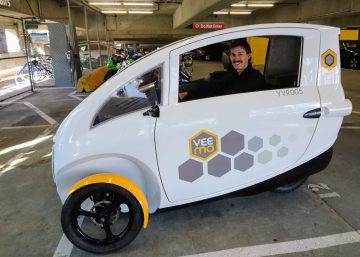
VeloMetro is a new urban mobility company dedicated to providing a practical and sustainable transportation alternative for a wide array of urban travelers. VeloMetro has designed a fully-enclosed electric-assist velomobile, and is introducing a vehicle sharing service, Veemo, using the new vehicles.
Veemo is a truly novel system: the vehicles blend characteristics of bicycles and automobiles, and the service blends facets of bike-share systems and free-floating car-share services. Thus, the potential performance and usage of Veemo are difficult to predict. VeloMetro wants to tune the vehicles and service to efficiency and environmental objectives, and so needs to understand how travelers use the velomobiles and how usage is influenced by vehicle and service attributes. VeloMetro also needs a robust analysis of the environmental impacts of Veemo, particularly displaced auto emissions.
This research project aims to develop new understanding about the potential performance, usage, and environmental benefits of Veemo with the following objectives: 1) evaluate travel patterns of Veemo users during a pilot launch of the service at the University of British Columbia, 2) estimate optimal operations attributes for scaling up the Veemo service, and 3) estimate the environmental impacts of Veemo at the pilot and urban scales.
The proposed research will provide important information to VeloMetro for tuning the Veemo vehicles and service to desired efficiency and environmental outcomes, and for scaling up the service and entering new markets. The potential role of human-electric hybrid vehicles in sustainable urban transportation systems in Canada will be illuminated, and Vancouver and other Canadian cities could accrue economic and environmental benefits from expanded low-cost and sustainable urban mobility options.